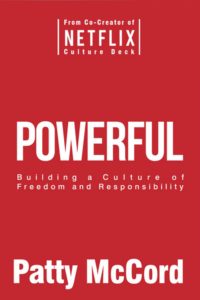 Patty McCord’s Powerful is an expansion of the Netflix Culture Deck (which she co-authored) from her perspective as the former head of HR at Netflix. It’s a quick read that covers a lot of ground. Much of what she says we should be doing resonated strongly for me.
Patty McCord’s Powerful is an expansion of the Netflix Culture Deck (which she co-authored) from her perspective as the former head of HR at Netflix. It’s a quick read that covers a lot of ground. Much of what she says we should be doing resonated strongly for me.
Early on, McCord makes an important distinction: that transforming culture is a matter of identifying behaviors, using language very similar to what I’ve often said when discussing cultural tranformation:
The most important thing to understand about transforming a culture, whether that of a team or a whole company, is that it isn’t a matter of simply professing a set of values and operating principles. It’s a matter of identifying the behaviors that you would like to see become consistent practices and then instilling the discipline of actually doing them.
McCord digs into the behaviors that matter — for team members, but mostly for leaders. She calls for clear and open communication of business strategy as well as open and honest conversation about performance. She also points out that when people appear clueless, that’s generally leaderships fault:
I expect you’ve had the experience of talking to someone on your team about a business issue and being asked a question that makes you think, This person is clueless! Well, next time it happens, I want you to say to yourself, Wait, right, this person is clueless. He doesn’t know what I know. So I have to inform him.
She also shared this advice: “How do you know when people are well enough informed? Here’s my measure. If you stop any employee, at any level of the company, in the break room or the elevator and ask what are the five most important things the company is working on for the next six months, that person should be able to tell you, rapid fire, one, two, three, four, five, ideally using the same words you’ve used in your communications to the staff and, if they’re really good, in the same order. If not, the heartbeat isn’t strong enough yet.” This reminded me of Julia Grace’s talk from The Lead Developer conference earlier this year in Austin, and I think it can be a useful measure of how well a team is focused on priorities at any level of a business.
McCord’s advice on feedback reads much like Radical Candor. Some of the ideas are more challenging. I’m fascinated as a manager with the idea that Netflix sets an explicit standard that it’s unacceptable to talk about people behind their backs except in the case of ethical concerns which need to be addressed confidentiality. I’m not sure that everyone would be comfortable with that, but I do find the idea intriguing, and it’s given me a new idea to explore.
McCord’s thoughts on hiring and building a team are thought-provoking. She suggests approaches hiring needs with a very future-centered approach that are quite different from the approaches I’ve typically seen: “In my experience, one of the most important questions business leaders must regularly ask is “Are we limited by the team we have not being the team we should have?”” Netflix’s performance system is decoupled from its compensation structure, and McCord suggests an approach to letting people go that many would find shocking. While I do agree with much in the case she lays out, I expect that many (including me) would find it difficult to be so freely willing to fire people (even in writing this, I wanted to avoid that language with “let people go”. But let’s face it, McCord is talking about firing people).
Something that bothered me about the advice McCord lays out in this book seems to ignore any risk of building a monoculture. Comments like: “it taught us that the best thing you can do for employees is hire only high performers to work alongside them,” show thinking that has caused the lack of diversity in our industry. The book mentions only mentions diversity in passing, and that’s a bit surprising for a book published today.
The biggest problem that I have with this book is this: the Netflix approach was developed with a strong, centralized push to embrace it. This book does little to suggest how to pull these ideas into a more traditional enterprise. For those of us not working at Netflix, that is likely to prove problematic. Nevertheless, I found it a thought-provoking and challenging read; and I mean that as a complement.